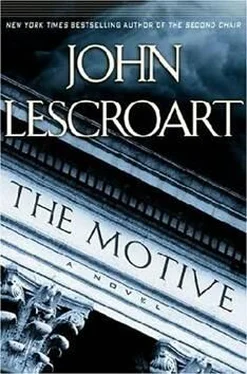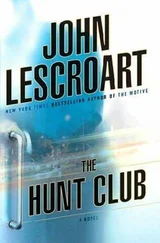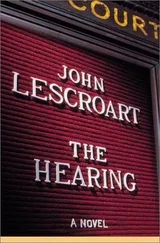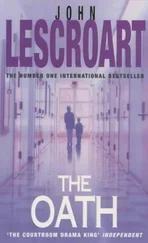The two left the Ferry Building with the reporter contingent, including Jeff Elliot, hanging back a respectable distance. The first several blocks along Market, while congested with foot and automobile traffic, nevertheless were relatively clean and populated with people who worked downtown. It had very little of the urban blight that Kathy West was hoping to expose, so it left her free to talk with Glitsky as they walked. Hooking her hand in his arm, she set a brisk pace. "I'm surprised to see you so soon. I'm assuming this is about Paul Hanover. Do you have something?"
"Pretty much what you wanted," Glitsky said. "I've talked to John Strout and Hanover's daughter-in-law, and between them got convinced that there's very little chance he killed anybody, including himself." In a few words, he outlined what he'd discovered-the entry wound over the right ear, the other one in the back of the woman's head. "So really that's about it. He could only have shot himself by some awkward contortion that makes no sense, and she had the same problem. So it probably didn't happen that way."
"When the chief said you were good, Abe, he wasn't kidding, was he?"
"I'll take lucky over smart every time. I ran into the right people."
They had gotten down as far as Seventh Street, and now the mayor's eyes were flicking back and forth rapidly, scanning for the signs of urban decay that Glitsky knew would begin appearing any minute. But her mind hadn't left their topic. "So what happens now?" she asked.
"What do you mean?"
"With the investigation?"
"Well, it continues, of course. Back with Inspector Cuneo, which is where it belongs."
A few more quick steps, and then she stopped abruptly. "This would be the same Inspector Cuneo who told the press this morning that this was a murder/suicide?"
Glitsky's lips went tight for a beat before he answered. "That's what it looked like to me, too, when I first got there."
"Yes, but you didn't tell anybody about it until you had more facts, did you?"
He showed her what he hoped would pass for a smile. "I've gotten a little more used to dealing with the media than your average inspector."
"Be that as it may, Abe, the fact remains that you've made real progress in half a day, and Inspector Cuneo hasn't been any part of it."
"That's not strictly accurate. He talked to Hanover's daughter-in-law first last night…"
"But managed not to learn that Paul had a withered arm."
"He didn't know where the entry wound was, so he wouldn't have known why that mattered."
"Precisely. When he could have shown some initiative and gone to the morgue with the body. Isn't that the case?"
Glitsky could only shrug. "Maybe he should have done that."
"You would have."
This was true, but Glitsky shrugged it off again. "Well, either way," he said, "we've got a good idea that Mr. Hanover didn't do anything wrong. That's what you wanted this morning."
She fixed him with that avian intensity. "But unfortunately, that's no longer the point."
Glitsky waited.
"The point, Abe, is that we now know that Paul was murdered, don't we? And you don't think it was the girlfriend, Missy. Which means they were both murdered by someone else. And that being the case, do you think I have any confidence at all that Inspector Cuneo will be more successful catching the person who killed one of my close friends and benefactors than he was identifying the cause or manner of death in the first place? You don't have to struggle with it. The answer is no."
The gaggle of reporters following them had stopped when they did, and now out of the corner of his eye, Glitsky thought he picked up an increasing awareness among some of them, including Jeff Elliot, that something significant might be transpiring here right in front of them between the deputy chief of inspectors and the mayor. He considered that the time might be propitious to try to get some mileage out of West's insistence that the two of them were really, basically, friends. He stepped closer to her, strove for a casual tone. "He couldn't keep his job in homicide if he wasn't effective, Kathy. Lanier would have lateralled him out."
"Abe." West wasn't having it. "Help me out here. I understand a little bit about politics, and I see your concerns. If it makes it easier for you, you can let Inspector Cuneo remain on the case in some capacity, but I'd count it as a personal favor if you stayed on with it, too. Whoever killed Paul Hanover isn't going to get away with it on my watch if I can help it, and you're the best man to see that he doesn't." She reached out and put a hand on his arm, looked up into his face. "Abe. Please. For me."
Glitsky glanced at the reporters, a couple of whom had already snapped some photos. This was turning into too visible a moment, laden with intrigue and import. It had to end or it would grow and become a real event, and he wanted to avoid that at all costs. At last, coming back to her, he patted West's hand in a fraternal gesture and nodded. "All right, Kathy," he said. "Let me see what I can do."
Cuneo lived alone on what had formerly been the grounds of the Alameda Naval Air Station, across the bay from San Francisco. The nine-hundred-square-foot standalone building, which back in the fifties had housed a marine engine repair shop, sat perched on a concrete slab that jutted out ten feet into the channel. All day, every day, flotillas of mostly small saltwater craft glided by his bedroom window, sometimes close enough to touch. The ferry to San Francisco passed every hour or so, too, as well as the occasional Coast Guard or naval vessel.
After six hours of fitful sleep, Cuneo-dreaming of fire-started awake at twenty minutes after four in the afternoon. Tangled up in his blankets, he was breathing hard and sweating. Throwing and kicking the covers off, he shot up to sitting and looked from side to side, getting his bearings. The smoke smell was real enough, all-pervasive in the small house. He let his breathing slow
down, the tendrils of his nightmare still clutching at his psyche.
For another minute or so, he sat as he almost never did, in absolute stillness. He wore only his Jockeys, but the stench of last night's smoke still clung to his skin. At last, unconsciously, he lifted the heel of his right foot, let it fall, lifted it again. In seconds, still unaware, he was tapping a steady rhythm on the concrete floor.
Next to the bedroom on the water in the back, a tiny, low-ceilinged workroom huddled to one side of the house. Going forward, the kitchen and bathroom divided the central segment of the building two-thirds to one, and after putting some water on to boil, Cuneo stopped in at the bathroom for a shower, mostly to get the smell off him. When he was done, wearing his towel, he made some Nescafe-two spoons of crystals, no sugar or cream, and went back to put on his clothes.
Up in the front of the house, a relatively spacious living room provided two front and two side windows that gave the space an open feel and plenty of light. A leather love seat sat against one wall, a small teak bookshelf and television stand on the other. By far the most immediately noticeable furnishing, though, was a full set of Lud-wig drums in the middle of the room. Cuneo didn't have any idea where his nearest neighbor's home might be, but it was at least out of earshot. He could play all day as loud as he wanted and nobody ever complained.
Three years ago, after his fellow inspector Lincoln Russell finally couldn't take partnering with him anymore,
Lieutenant Lanier had recommended that maybe he might want to see a psychologist-his insurance through the city would pay for the first three visits-and try to get some handle on why he couldn't ever sit still, or shut up. He would sing to himself driving to crime scenes, hum during interrogations, often break into unconscious song while he wrote up his reports in homicide. Maybe he had Tourette's syndrome, or Saint Vitus' dance or something, Lanier had suggested, and if he did, it would be better to at least know what he was dealing with.
Читать дальше












